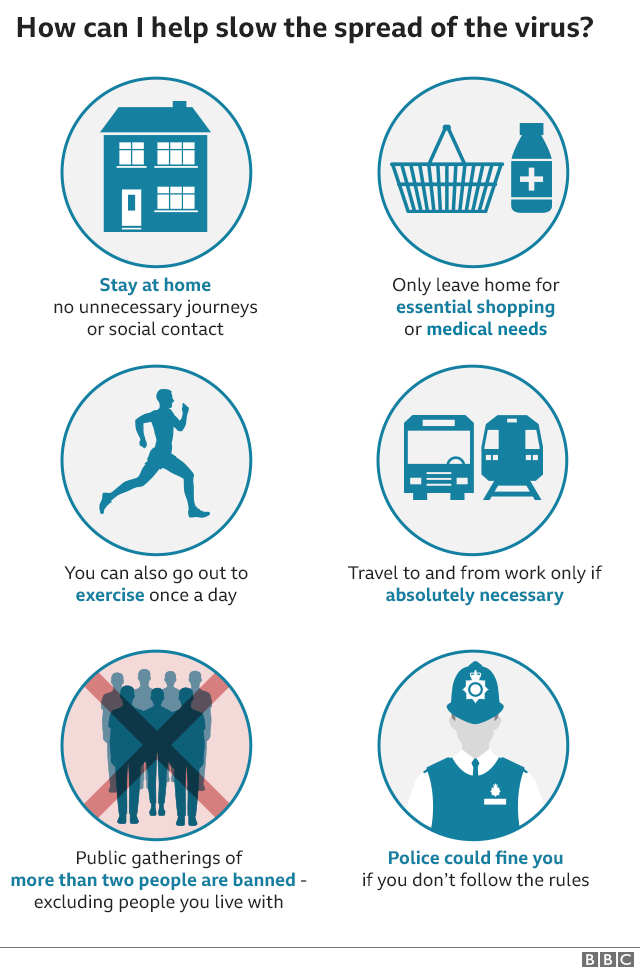Share the post "Coronavirus: Strict measures could last ‘significant period’"
The UK is facing a “significant period” of strict measures to cope with the coronavirus outbreak, Cabinet Office minister Michael Gove has said.
He declined to predict exactly how long the instructions to stay at home could last, saying the date the virus peaked would depend on how people behaved.
Mr Gove said it was “vitally important” to follow social distancing rules.
It comes as Boris Johnson has written to all UK households saying the crisis will get worse before it gets better.
In the letter, being sent to 30 million homes, the prime minister warned stricter restrictions could be put in place if necessary.
The number of people who have died with coronavirus in the UK has reached 1,019, with the latest 260 deaths announced on Saturday.
There are now 17,089 confirmed cases in the UK.
Tough measures to tackle the spread of coronavirus, including a ban on public gatherings of more than two people and the closure of shops selling non-essential goods, were introduced last week.
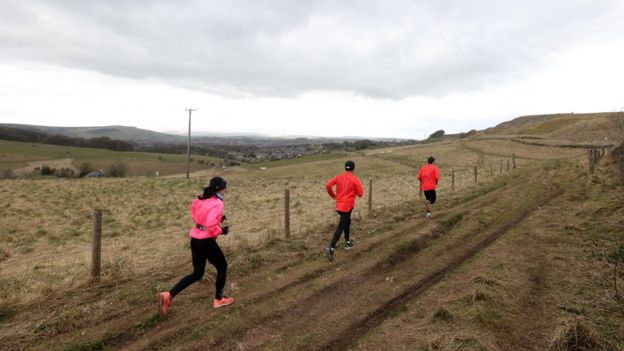
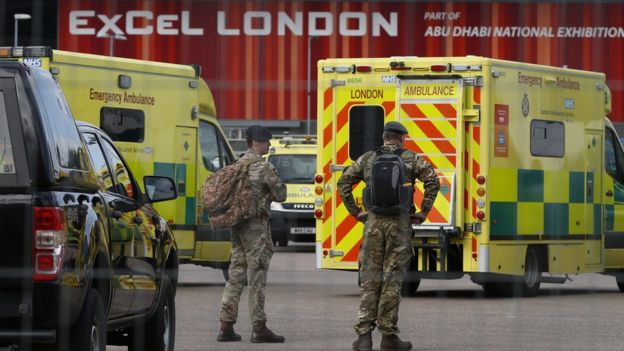
People were also told they should only leave the house for four reasons: shopping for basic necessities, exercise, any medical need and travelling to work if you cannot work from home.
Experts expect coronavirus cases and deaths to keep rising for the next two to three weeks, before the effects of social distancing measures and restrictions on everyday life begin to have an impact.
How much longer?
Asked on the BBC’s Andrew Marr show how long the measures might go on for, Mr Gove said: “So I can’t make an accurate prediction but everyone, I think, does have to prepare for a significant period when these measures are still in place.”
“I wish I could predict when this will end, but it’s vitally important that at the moment and for weeks ahead the people maintain the strict social distancing guidelines that have been laid out.”
Mr Gove said the peak of the crisis would depend “on all of our behaviour”.
“It’s not a fixed point, a date in the calendar,” he said, “it is something that all of us can affect by our actions.”
Responding to reports the current measures could be in place until June, Scotland’s chief medical officer Catherine Calderwood told BBC Radio 4’s Broadcasting House: “The modelling that’s been done, and that I have seen, has always said that we need at least 13 weeks of some sort of measures in order to really get this virus away from spreading amongst people.
“When you have a shorter period of time, as I understand other countries have done, as soon as you lift the measures the virus comes back again because you haven’t stopped it transmitting amongst lots of people.”

- A SIMPLE GUIDE: How do i protect myself?
- AVOIDING CONTACT: The rules on self-isolation and exercise
- LOOK-UP TOOL: Check cases in your area
- MAPS AND CHARTS: Visual guide to the outbreak
- STRESS: How to look after your mental health

Asked to clarify how much time people could spend exercising outside their homes, Mr Gove said: “It depends on each individual’s fitness.” The government has not so far issued a time limit for exercise, but has urged people to stay local.
“I would have thought that for most, a walk of up to an hour, or a run of 30 minutes, or a cycle ride between that, depending on their level of fitness, is appropriate,” Mr Gove said.
And Mr Gove said once the UK had “beaten” the virus, “then we can reflect, draw appropriate lessons and learn how to deal with public health situations in the future”.
Health Secretary Matt Hancock said the government was now testing 10,000 people a day, and was “on track” to test 25,000 a day by mid-April. Testing has also been ramped up for frontline hospital staff to see whether they have the virus.
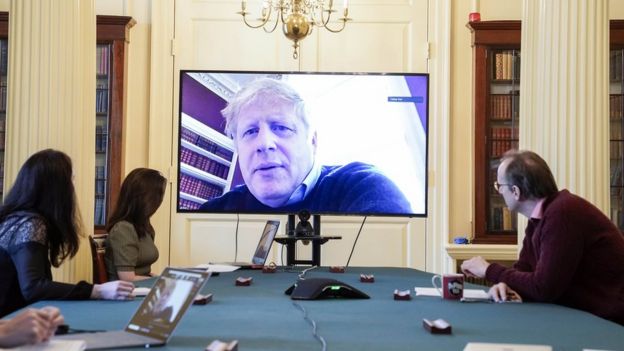
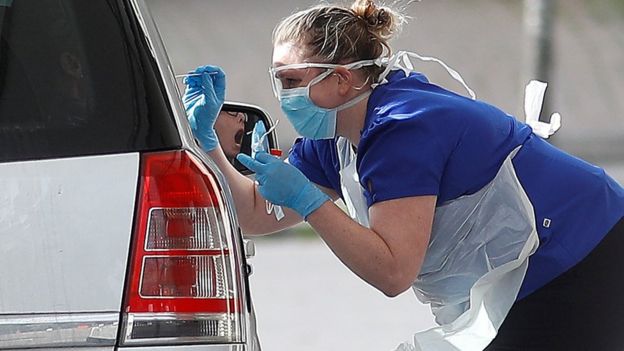
In the letter being sent to 30 million households at an anticipated cost of £5.8m, Mr Johnson – who is self-isolating in his Downing Street flat after contracting coronavirus – writes: “From the start, we have sought to put in the right measures at the right time.
“We will not hesitate to go further if that is what the scientific and medical advice tells us we must do.”
Britons will also receive a leaflet detailing government rules on leaving the house, guidance on hand-washing, an explanation of coronavirus symptoms and advice on shielding vulnerable people.
“It’s important for me to level with you – we know things will get worse before they get better,” the letter reads.
“But we are making the right preparations, and the more we all follow the rules, the fewer lives will be lost and the sooner life can return to normal.”
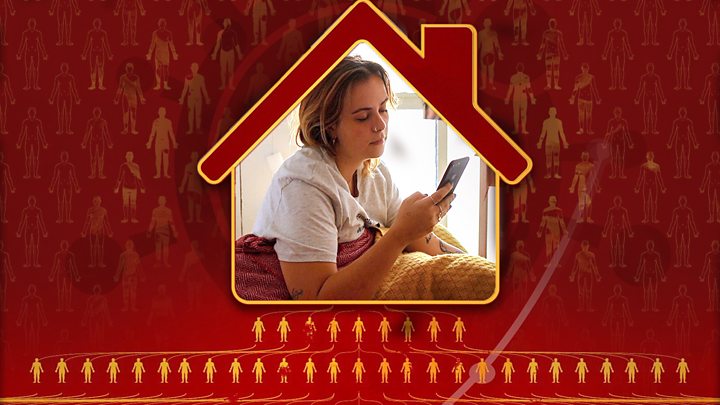
In his letter, Mr Johnson describes the pandemic as a “moment of national emergency”, and reiterates the government guidance to stay at home to avoid putting pressure on the NHS, so that lives can be saved.
Meanwhile, new powers, including fines of up to £5,000, to enforce guidelines on people staying at home and businesses staying closed came into force in Northern Ireland on Saturday evening.
In England, Scotland and Wales, magistrates could impose “potentially unlimited” fines on businesses, if they do not close or pay penalty notices.
Across the UK, individual people ignoring restrictions could be hit with a £60 fine initially and another £120 for a second offence. In England, Scotland and NI those fines could rise to a maximum of £960 for repeat offences.
In other developments:
- The first of three flights chartered by the Foreign Office to bring home British tourists stranded in Peru will leave the capital Lima on Sunday
- Domestic abuse victims are still allowed to leave home to seek help at refuges despite the restrictions, Home Secretary Priti Patel has said
- The Duke and Duchess of Cambridge are supporting a Public Health England initiative giving people tips on looking after their mental health during the pandemic as the government provides an additional £5m funding to charities to expand their services
- Recruitment for volunteers to help in the crisis has been paused, after 750,000 people signed up less than a week after the appeal was announced.
- Former Prime Minister Tony Blair suggested “mass testing” was needed to avoid another surge of virus cases when restrictions are finally eased, telling Sky News’s Sophy Ridge on Sunday: “You need a very clear understanding of who has got it and who hasn’t”
- Food parcels have begun to be delivered to the most vulnerable people in England who are being told to stay at home for the next three months to protect them from coronavirus
- The Foreign Office said it was working “around the clock” to support British travellers stranded in India amid a government lockdown.
As well as the prime minister, Health Secretary Matt Hancock is also self-isolating after testing positive for the virus. The UK’s chief medical officer, Prof Chris Whitty, is also self-isolating, but has not tested positive.
